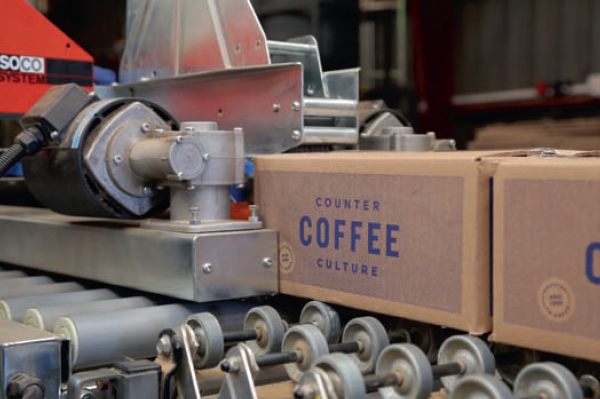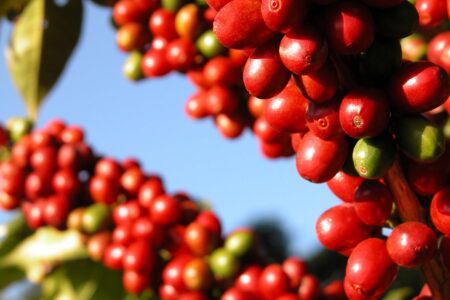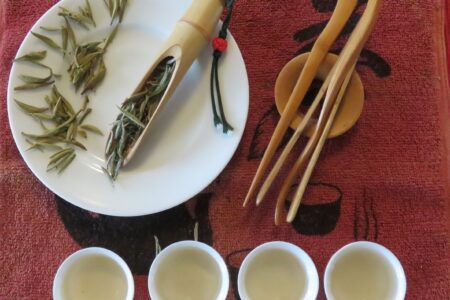On a Relentless Pursuit of Coffee Perfection

Amid mergers and acquisitions, Counter Culture Coffee continues to make its mark as a thriving independent roaster. With sustainability at its core, Counter Culture Coffee has helped refine the specialty coffee industry by providing education and quality coffee throughout North America.
By Anne-Marie Hardie
It’s been frequently stated that behind every cup of coffee, there is a story. And for, Counter Culture Coffee, the stories could easily fill an entire book case. The tale of Counter Culture Coffee began in Chapel Hill, North Carolina, when University of North Carolina business student Brett Smith went on a mission to find an opportunity that would put his newly acquired skills into action. “I had entered school with the thought of starting or taking over a small business, but I didn’t know what it would be,” said Smith.
It was the mid 1990s. Starbucks Coffee was making headlines in every major outlet, and Smith’s sister, who lived in Seattle, the birthplace of Starbucks, shared stories about the coffee wave. “I thought, maybe there was something there,” he said. Although not a coffee drinker – Smith’s sole exposure to the beverage was as a drink during exam periods – he was intrigued by its global reach and supply chain.
During his research, Smith came across a mail-order coffee company that piqued his interest. He arranged a lunch meeting with Fred Houk, an employee of the company who worked in operations, to discuss the possibility of buying out the company. “We talked for three hours,” shared Smith. “But instead of making an offer on the business, Fred and I thought, why don’t we just do this on our own?”
It was the perfect partnership merging Houk’s extensive coffee knowledge with Smith’s aptitude for business. Their goal was to create an exceptional coffee product for the wholesale market, beginning with the restaurant industry. To get there, Counter Culture Coffee invested in a 10kg Sasa Samiac roaster (from France) providing Houk with the necessary equipment to create their own specialized batch roasts while Smith researched the local restaurant market for potential buyers.
The first bag was sold to Pop’s Trattoria in Durham, NC, in 1995, three months after the idea of the company was born. “We were blessed to be in a market that had a strong culinary community,” said Smith. “The local chefs were committed to offering high quality food for their customers, this set a high bar for us as a company.” Working with chefs helped set the tone of Counter Culture Coffee, focused on quality, and supporting and cultivating a positive a relationship with its customers.
Training and education has become a vital part of these relationships, with Counter Culture Coffee demonstrating the methods that will produce a consistent, quality cup, each time. “It’s a special industry that is both creative and exciting,” said Smith. “And at the end of the day, we get to drink a wonderful product – it’s been an amazing thing to be a part of for the last 23 years.”
These two principles formed the foundation of Counter Culture, creating a culture of social, environmental and economical sustainability. “It has simply become who we are,” said Smith. This began with connecting with coffee producers directly to source the highest quality green coffee. “If you don’t break bread with the person, then you don’t understand each other needs,” said Smith. “It is only by working with suppliers that the product will continue to evolve.”
It is these relationships that enabled Counter Culture Coffee to explore processing methods and new varietals to develop the coffee that best responds to its business needs.
Blending Passion and Purpose
Today, Counter Culture has formed a green team whose sole focus is to develop these producer relationships. The on-site visits create a dialogue where they share challenges and help push each other to produce a better product. “It’s so important to understand what the farmers needs are and for them to understand what is going on in the world,” said Smith. “The specialty coffee market has and always will continue to evolve.”
Developing the farmer relationships remains a critical part of Counter Culture success. Although some farms have come and gone over the years, there are others that have evolved their business practices to meet the parameters of Counter Culture Coffee. “Some might have tried to sell us coffee, but it was rejected for not meeting our standards,” said Smith. “However, we worked with them, and they made the suggested changes, and now we have a quality product that we can bring to our market.”
It is these personal and business philosophies that helped to shape the business to where it is today. In fact, their first venture into environmental sustainability was born from Houk’s love for birds.
An avid bird watcher, Houk had attended a presentation on shade-grown coffee and how this method of coffee production was not only creating a higher quality product but replacing lost habitats for migrating birds. “Fred walked in one day, extremely passionate, sharing his findings from the presentation on shade-grown coffee,” said Smith. “It was something that we knew that we had to do – it brought Fred’s two loves together, while meeting our commitment to sustainability.”
Counter Culture Coffee created the Bird Friendly coffee line, Sanctuary, which was launched at the Specialty Coffee Association of America (SCAA)Expo in New Orleans in 1997, making its mark as their first branded product, and one of the first roasters to sell shade-grown coffee.
As they entered the new millennium, Counter Culture Coffee noticed a wonderful transition in the coffee industry, the growth of independent coffee shops. It seemed only natural to extend their training, education, and products to this budding market. “It was in the early 2000s and consumers were starting to experiment with specialty coffee in a variety of venues, looking for different options to sample and developing their palate,” said Smith. “It was a wonderful movement to be a part of.”
When talking about roasting, Smith immediately returned to the vision statement. “We are on a relentless pursuit of coffee perfection,” he said. “This involves taking the roasters and modifying them to meet our needs, and adding equipment like an optical sorter, to further refine the roast.” Counter Culture was one of the first roasters in North America to use an optical sorter.
Counter Culture has a combination of roasters in all its facilities, including the first French roaster which is still used daily to produce small-batch roasts, Probats from the 1950s, and a Loring roaster, known for its consistent roasts and lower emissions. When choosing a roaster, Smith shared that the goal is to bring out the best in the coffee, including adjusting the machinery to create the roast profile that they are seeking.
The optical sorter helps identify defects that can’t be seen by the human eye. “It provides an additional opportunity to control the quality of cup, and yes, we may throw out a bit,” said Smith. “But it’s worth it to improve the cup quality and consistency of our product.” In addition to the optical sorter, Counter Culture continually cups the coffee, of course, to ensure that the coffee is “consistently awesome” from coast to coast.
Green Through and Through
Counter Culture Coffee has identified the importance of ensuring that its employees’ needs are met. This includes employing a full-time human resource manager, paying a living wage and going beyond traditional benefits to support both the health and financial wellness of their employees. “We also have our own green fund where employees apply for a grant to fund their own personal sustainability initiatives, from building a backyard garden to joining a health club,” said Smith. Their vision is to make Counter Culture simply a great place for people to work. “Philosophically, it is simply the right thing to do,” shared Smith. “But also, the stronger the team, the more excited they are to participate as part of the company.”
On, 10 March 2003, Counter Culture Coffee decided it was time to place their verbal philosophies on paper, signed by Brett Smith and co-owner Peter Giuliano (who left the company in 2012 to join the SCAA), and Daryn Berlin, one of the first employees of the company who is now the new market development director. Since that time, Counter Culture has continued to work within their principles and further formalize it.
“We try to always live and work through the lens of sustainability,” said Smith. “It is not just a piece of paper to us, it is a real commitment to social, environmental and economical sustainability.” Sustainability is deeply entrenched throughout the organization, with a continued focus on environmental, economic and social initiatives. From their daily operations to overall agronomy practices, all decisions are analysed through the lens of sustainability.
This includes creating the position of Counter Culture Sustainability Coordinator in 2015. However, the reality, Smith explained, is that sustainability is a focus for all employees. The sustainability coordinator, Meredith Taylor, helps to ensure that the company is on track, including monitoring the progress on its environmental waste goals to achieve its 2024 reduction objective. The annual transparency report communicates the company’s actions to the public.
Fiercely Independent
From the very beginning, the goal for Counter Culture Coffee has been to produce high quality products while being a great partner with its suppliers and customers. This includes making the decision to adopt an extremely specialized approach towards its products, focusing only on coffee. “We want to do an extraordinary job with our product,’ said Smith. “It’s about not finding as many products as you can sell but finding the products that you can excel with.” Today, Counter Culture Coffee can be experienced in a variety of locations including restaurants, independent coffee shops and online.
The 12 training centres across North America offer classes, workshops and hands-on training, providing tools and techniques that will enhance the coffee experience. In addition to the pre-registered classes, the education centres are open to the public, every Friday at 10am for a weekly cupping session.
When asked about the recent mergers and acquisitions that have been occurring in the industry, Smith shared that although there have been individuals who have expressed interest in Counter Culture Coffee, they are currently not looking at being acquired.
“We feel very confident that we are heading towards our goals, and if we can continue to get there without outside investment, then we will,” said Smith. “Staying independent just feels really good for us, right now.” Although, Smith recognizes the value of outside investment, Counter Culture feels both excited and inspired by the fact that they can continue to challenge themselves, internally, and work together to achieve their goals.
When asked about the future, Smith immediately returns to that three-hour lunch with Houk, who left the company in 2001. “Fred was the original coffee guy, he helped to fine-tune us to where we are today,” said Smith. “It’s amazing that the early principles that we set for ourselves all those years ago continue to drive Counter Culture Coffee, and it’s exciting to see how the company will continue to grow and evolve in the upcoming years.”
Anne-Marie Hardie is a freelance writer, professor and speaker based in Barrie, Ontario. She may be reached at: [email protected].



